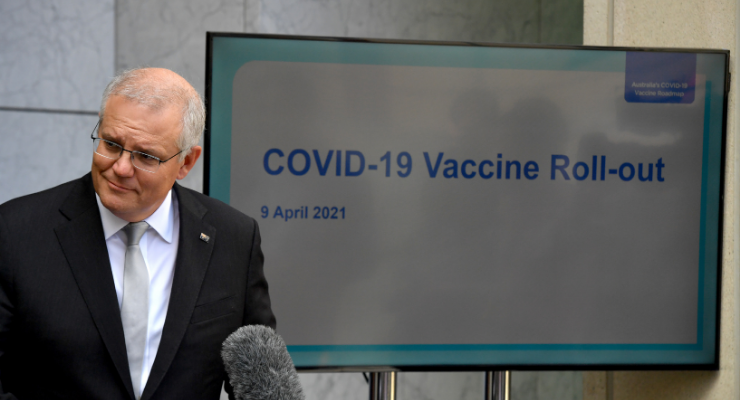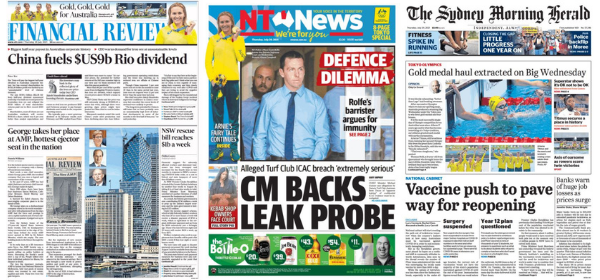
RATE EXPECTATIONS
At the current rate, most people in NSW won’t be vaccinated until the end of the year, the SMH reports. That’s despite 12,000 more AstraZeneca jabs being given every day compared to before Delta took hold, while Pfizer is outstripping AZ by about 5000 more vaccinations a day. Meanwhile in Queensland, 159 people will be getting their third jab of Pfizer, The Australian ($) reports, after Rockhampton Hospital gave out a handful of vaccinations with a low dose to an unknown few.
The slow vaccination rate means there could be more lockdowns to come this year — Premier Gladys Berejiklian has said that around 75-80% of the population (around 5 million NSW residents) would need to be vaccinated for life to go back to normal, as the Herald Sun ($) reports. But Scott Morrison insists that “we’ll be living life different at Christmas than what we are now”. The federal government is considering the Doherty Institute’s modelling on the break-even point of vaccinations and lockdowns. On Friday, states and territories’ leaders will be given detailed targets about how many must be vaccinated to avoid border closures and business shutdowns, the SMH reports.
Perhaps a sign of things to come once NSW is mostly vaxxed can be found by looking at aged care, The Australian ($) says, where just six cases have been recorded during this outbreak from more than 2500 state-wide infections. Health Minister Greg Hunt says 82% of aged care residents in NSW are now fully vaccinated.
[free_worm]
GETTING A RISE OUT OF HIM
Scott Morrison has confirmed the payment for workers who have lost hours during the shutdown will increase. As Guardian Australia reports “one of the measures includes an extra $200 payment for welfare recipients in NSW who have lost more than eight hours’ work per week. Other disaster payments will be increased from $600 to $750 as a maximum and for people who have lost less than 20 hours’ work, from $375 to $450 per week.”
The increase to $750 a week makes it the same amount as the now-defunct JobKeeper scheme — the difference, Morrison said, is that it goes straight into the hands of the workers this time. Casual workers and visa holders are now eligible, as The Australian ($) reports — two groups who missed out last year. It comes after ABC found $4.6b in JobKeeper money went to businesses that actually increased their profits.
The higher end of town is included in the bailout package too — as it stands, NSW businesses who turnover up to $250m can get up to $100,000 a week. That’s up from the prior turnover limit of $50m, and loops in about 1900 more businesses. The maximum grant increased tenfold, from $10,000. If you’re a sole trader, your weekly payment is capped at $1000 in NSW, as The Conversation explains.
In Victoria, places like gyms, cafes, restaurants, and hairdressers who have capacity limits can get $5000, while large licensed venues get up to $20,000. Small businesses can get up to $5000 (if their revenue has decreased by 70%), while landlords and commercial tenants can get access to financial relief too, depending on their situation. The Herald Sun explains how Victorians can claim a grant.
MATTERS OF THE ART
The National Art Gallery of Australia (NGA) has promised to return stolen artefacts to India, in what is its single largest repatriation of art. ABC reports 13 artworks were purchased from dealer Subhash Kapoor — but the NGA has since found many were looted or stolen in India. Of the 13, there are six sculptures, six photographs, a painted scroll, and a brass processional standard, The Australian ($) says. Kapoor is accused of masterminding an illicit global trade in Indian and Asian antiquities worth more than $196m.
This year has seen several other instances of countries returning artworks — some obtained over a century ago — particularly as movements like Black Lives Matter have seen galleries grapple with the ethics of their collections. Among them, Belgium, whose Africa Museum underwent a “decolonisation process” that identified more than 2000 statues, musical instruments and weapons acquired illegally, The Guardian reports, during a colonial rule in the Democratic Republic of the Congo. Germany has also pledged to return priceless artefacts to Nigeria, as BBC reports, known as the Benin Bronzes taken from the Kingdom of Benin in 1897.
India’s government welcomed the NGA’s move — India has actually mounted a major international effort to find thousands of antiquities that were looted from temples and illegally sold overseas over time.
OLYMPIC EFFORTS
Here’s a quick run-through of key Olympics events that happened while you slept, courtesy of The Guardian, CNN and The New Daily’s coverage:
- The Olyroos are out of the Games after losing 2-0 to Egypt
- Andy Murray’s pursuit of a fourth Olympic medal is over after bowing out in the men’s doubles quarter-finals alongside Joe Salisbury
- Twenty athletes, including 10 from Nigeria, will not be allowed to participate in track and field because they didn’t meet anti-doping testing requirements
- Simone Biles’ sponsors are vowing to stand by her after she withdrew from Olympic events to focus on her mental health
- Japan is currently leading the Olympics with 13 gold medals.
There are loads more on today, including day one for golf and BMX racing. There’s also swimming, hockey, rugby, and canoeing — check out ABC’s guide for more.
ON A LIGHTER NOTE
An incredible jewellery heist has gone down in the UK — in fact, the biggest theft of its kind in the UK’s history.
Here’s what happened: back in 2016 a woman named Lulu walked into a jewellery store called Boodles (why does this sound like Melbourne’s latest designer dog breed?) claiming to be a gem expert. She was there to assess seven diamonds — one worth 2.2m pounds (A$4.3m) — on behalf of prospective Russian buyers. After her inspection, Lulu switched the seven diamonds for garden pebbles. Three hours later she was under the channel on her way to Paris.
Here’s where it gets even more mysterious: Lulu has been found guilty of the heist, but she swears it was actually carried out by her sister Liliana, who was wanted in Switzerland for an almost identical plot — switching an envelope containing 400,000 euros (A$642,000) for one filled with paper. But Liliana has since died — she was killed in a car crash in October 2019.
Lulu was sentenced to five and a half years in the big house. As for the whereabouts of the seven diamonds — worth about A$8m all up — nobody knows.
Hoping your Thursday includes a little intrigue. Drop me a line, say hi, tell me about how things are going with you — eelsworthy@crikey.com.au.
THEY REALLY SAID THAT?
All of Australia, like our Olympians, we go for gold on getting those vaccination rates where we need to go … I know every Australian has that Olympian spirit in them, and I have great confidence that we will beat this, Australia.
Scott Morrison
The prime minister evidently didn’t learn his lesson that our highest-elected official comparing poorly-handled deadly national crises to sporting events is a little on the nose. Morrison made a similar gaffe in the depths of the bushfire crisis when he said Australians — some of whom had all their worldly possessions incinerated and loved ones lost in the country’s worst bushfire season in modern history — would be inspired by the “great feats” of cricketers at the SCG.
CRIKEY RECAP
A supreme crisis of federalism: ineffectual central authority has cut states adrift
“Melbourne became like itself, only more so — the world’s first emo city. The Cain government was in some ways a continuation of the social liberalism of the Hamer government, and after an eight year interregnum, Labor was returned to power. The Andrews government is, in many respects, well to the right of Hamer, but the notion that freedom and flourishing come through universal enablement is well embedded.
“The deep cause of this is often taken to be the division between convict cities and free ones (Melbourne had some convicts, but very few). Sydney was an authoritarian state before it was a society; the state presented itself as something necessary, but inimical to human freedom. In Melbourne and Adelaide, the violent capricious state was turned outwards onto the Indigenous, by that very means establishing a degree of shared consensus among whites. The state was cosa nostra — our thing.”
Seven people and groups who want the anti-vaxxer vote at the next election
“Anti-vaccine and vaccine-sceptic groups and individuals are campaigning, fundraising and and registering to run in the federal election, hoping to capitalise on the interest around vaccines to gain a foothold in Australian politics. With less than a year to go until the latest date that the federal election can be held, COVID-19 vaccinations are shaping up to be a — if not the — defining issue.
“The government is heralding the number of Australians who’ve been vaccinated and the doses procured. Meanwhile, Labor has narrowed in on the stunted rollout (and the lack of quarantine facilities). Beyond the rollout, vaccine passports and potential restrictions for those who refuse to be immunised will feature in some way and have already been staked out as important policy decisions to be made. These decisions will no doubt be viewed with both an eye to the science as well as to their electoral impact, with somewhere between 10% and 15% of Australians saying they’ll never get vaccinated.”
Tempers flare in Roberts-Smith trial as lockdown bites and disrupts
“Seven and a half weeks into the Ben Roberts-Smith defamation hearing, tempers are flaring. The continual delays in the trial caused by the Sydney lockdown are starting to wear down all participants. No one has yet uttered the legal maxim “justice delayed is justice denied”, but they will — this case could drag out for months. Former SAS soldier Roberts-Smith is suing The Sydney Morning Herald, The Age and The Canberra Times over a series of reports which he says depicted him as a war criminal and a murderer. He denies all allegations, and the newspapers are relying on the defence of truth.
“This morning there was a case management hearing in the Federal Court largely concerning the timetable for SAS witnesses — most of whom, because they are based in WA, would be subject to the restrictions of the Sydney lockdown. Most of this group have indicated they do not want to travel to NSW and be subject to quarantine.”
READ ALL ABOUT IT
A PhD student may have stumbled across the world’s oldest known animal fossil (ABC)
Citing new data, Pfizer outlined a case for booster shots, but there’s a debate over whether they’re needed (The New York Times)
Pfizer-BioNTech’s COVID-19 vaccine gets slightly weaker over time (The SMH)
Listening to literature — what we gain and lose with audiobooks (Quillette)
Ambitious plan for Melb Cup crowd revealed (Herald Sun)
Chinese officials and Taliban meet, in sign of warming ties (Al Jazeera)
Why real estate voyeurism still runs hot even while houses slip further out of reach (The Conversation via ABC)
Remington: US gunmaker offers $33m to Sandy Hook shooting victims (BBC)
Thousands of scientists warn climate tipping points ‘imminent’ (Al Jazeera)
Blood clots not higher after second AstraZeneca jab (The New Daily)
China fuels record $US9b Rio dividend (AFR)
THE COMMENTARIAT
Now that Australia’s inflation rate is 3.8%, is it time to worry? — John Hawkins (The Conversation): “Suddenly, Australia’s annual inflation rate is 3.8%, having jumped from 1.1% for the twelve months to March. The June quarter jump follows a jump in the United States to 5.4% and a jump in New Zealand to 3.3%, sparking a debate between leading pundits such as former US treasury secretary Larry Summers and Nobel Prize winner Paul Krugman about whether high inflation is on the way back, after years of playing dead. The best advice is not to worry. Most of the jump is only temporary, the result of several one-offs.
“As the Reserve Bank told us back in May, a main cause is that in the depths of COVID lockdowns last year, the government heavily subsidised child care, pushing the effective price to near zero. With removal of those subsidies the price has bounced back. This is a one-off — it can’t be repeated … Petrol prices also collapsed as cities locked down last year, and have since returned to pre-COVID levels. There were also big jumps in the prices of some fruit and some vegetables due to a shortage of pickers and heavy rainfall. They are also best seen as one-offs.”
Conservative vote splinters as senior Liberals walk — Peta Credlin (The Australian) ($): “The lesson of recent history is that when Liberal governments move to the left, they’re less likely to pick up votes from Labor than to bleed votes to the right, which they then can’t rely on getting back via preferences. By vacating the field and running with minor parties, former Coalition conservatives just give left-leaning Liberals a stronger policy voice in the party room and further entrench the disconnect between the parliamentary party and traditional supporters. Those conservatives that walk rarely get elected so it’s always been my argument that you’re more likely to influence the Liberals to stand by their principles from inside the party and going toe to toe with the moderates than by ‘crying in the wilderness’ outside.
“If the defection of right-wing Liberals tends to make the remnant party more left-wing, the defection of right-wing members likewise tends to make Labor more left-wing. Ironically, the defection to the conservative Family First party of two former South Australian Labor ministers, Jack Snelling and Tom Kenyon, could also mean that right-wing voters end up delivering left-wing government as neither of them are likely to support a formal allocation of preferences to the Liberals.”
Here in Jerusalem, we Palestinians are still fighting for our homes — Mohammed El-Kurd (The Guardian): “I am tired of reporting the same brutality every day, of thinking of new ways to describe the obvious. The situation in Sheikh Jarrah is not hard to understand: it is a perfect illustration of settler colonialism, a microcosm of the reality for Palestinians across 73 years of Zionist rule. This vocabulary is not theoretical. It is evident in the attempts to throw us out of our homes so that settlers can occupy them — with the backing of the regime, whose forces and policies provide violent support for the transfer of one population to install another.
“I do not care whom this terminology offends. Colonial is the correct way of referring to a state whose forces collude in the violence of settlers; whose government works with settler organisations; whose judicial system uses expansionist laws to claim our homes; whose nation-state law enshrines ‘Jewish settlement’ as a ‘national value … to encourage and promote’. The appetite for Palestinian lands — without Palestinians — has not abated for over seven decades. I know because I live it.”
HOLD THE FRONT PAGE

WHAT’S ON TODAY
Australia
-
Author and actor Matt Nable launches his new thriller novel, Still, via webinar for Avid Reader.
-
The House of Representatives committee inquiring into mental health and suicide prevention will hold a public hearing via videoconference.
-
Clean Energy Finance Corporation chief executive Ian Learmonth will appear in a virtual roundtable discussion about financing Australia’s clean energy sector.
-
NZ high commissioner and Minister for International Development Zed Seselja will speak at ANU event.
Brisbane
-
Queensland opposition leader David Crisafulli will give an address about the LNP’s reform and relevance at a Queensland Media Club lunch.
-
Chief executive officer of Universal Store Alice Barbery joins host Sofie Formica at the Brisbane Business Hub to share her insights and future predictions.
Perth
-
Emerging Indigenous artist Tyrown Waigana, winner of the 2020 National NAIDOC Poster Competition, will give a talk at the City of Perth Library.











We all know what a “confidence” fraud Morrison is – but “great”? …. You can spot him a mile off.
Apparently the vision and discernment of some is easily dazzled by show biz fakery
You obviously know nothing about the Olympic Games. And not much about geography, it seems – unless it’s an afternoon nap you’re referring to?